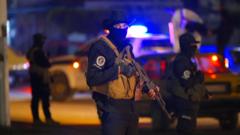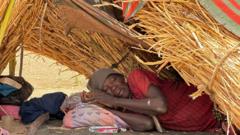In a chilling account of the sectarian violence that erupted against Syria's Alawite minority, survivors recount harrowing experiences of loss and the complicity of government forces in the chaos. Amidst ongoing investigations, the future of the affected communities hangs in the balance.
Eyewitness Accounts Unveil Sectarian Violence Against Alawites in Syria

Eyewitness Accounts Unveil Sectarian Violence Against Alawites in Syria
A recent report reveals the devastating sectarian violence against the Alawite minority in Syria, detailing firsthand accounts of survivors and the involvement of security forces in the killings.
In a deeply troubling revelation from Syria, one of the men implicated in the violent attacks against the Alawite minority has claimed that he was guided by government security personnel during the events that transpired in March. In an interview with the BBC, Abu Khalid stated that he was among a group of armed civilians sent to the village of Sanobar under the watch of the General Security department, which issued orders to target only insurgents rather than civilians.
On March 7, Abu Khalid recorded a video of himself shooting a 64-year-old local resident, Mahmoud Yusef Mohammed, asserting that the elder was an armed insurgent, despite evidence suggesting otherwise. The United Nations reports that countless individuals remain displaced following a wave of violence that left around 900 Alawite civilians dead in the coastal regions of Syria, further complicating an already volatile security situation.
Witness accounts describe the aftermath of the coordinated raids on Sanobar, where a large number of armed groups carried out summary executions of Alawite villagers over a few harrowing days. Survivors recounted the fear that permeated the village as gunmen invaded homes, pulling out men and executing them in front of their families.
Abu Khalid's arrest has shed light on the broader context of these attacks, which arose after responses to insurgent raids led to a surge of sectarian backlash against Alawite communities, often seen as complicit in the previous regime’s repression. The local military police have denied any coordination with civilian fighters like Abu Khalid, who face accusations of perpetrating heinous attacks against innocent individuals.
As investigations proceed with some identified perpetrators arrested, the potential for justice remains uncertain in a region marked by sectarian divisions. The Syrian Network for Human Rights has documented the violent encounters that have exacerbated longstanding grievances, amidst the backdrop of a new government struggling to assert order.
Survivors share a collective grieving experience amidst mass graves and the fear of retribution, indicating a community fractured by violence. The Alawite plight reflects a broader struggle for recognition and safety in a nation still grappling with the consequences of civil war, as calls for accountability ring hollow amidst continued turmoil.
In the wake of such incidents, the future of Sanobar serves as a bellwether for the Syrian state’s ability to maintain social cohesion without relying on the oppressive tactics reminiscent of the past. The plight of minorities like the Alawites remains intricately tied to the state’s efforts to establish a new order amid healing and reconciliation challenges.





















